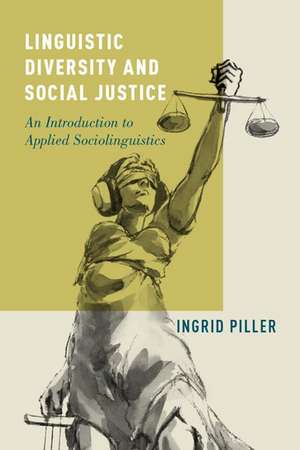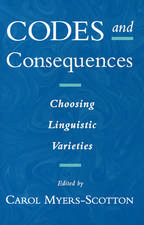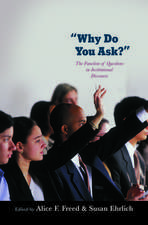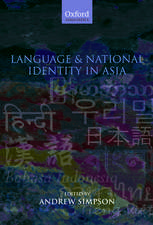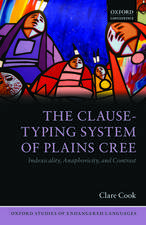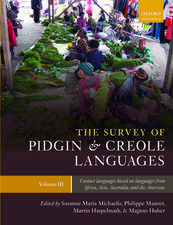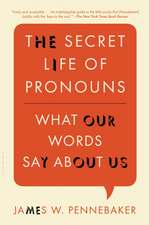Linguistic Diversity and Social Justice: An Introduction to Applied Sociolinguistics
Autor Ingrid Pilleren Limba Engleză Paperback – 26 mai 2016
| Toate formatele și edițiile | Preț | Express |
|---|---|---|
| Paperback (1) | 257.30 lei 31-37 zile | |
| Oxford University Press – 26 mai 2016 | 257.30 lei 31-37 zile | |
| Hardback (1) | 817.53 lei 31-37 zile | |
| Oxford University Press – 12 mai 2016 | 817.53 lei 31-37 zile |
Preț: 257.30 lei
Preț vechi: 300.62 lei
-14% Nou
Puncte Express: 386
Preț estimativ în valută:
49.24€ • 51.22$ • 40.65£
49.24€ • 51.22$ • 40.65£
Carte tipărită la comandă
Livrare economică 03-09 aprilie
Preluare comenzi: 021 569.72.76
Specificații
ISBN-13: 9780199937264
ISBN-10: 0199937265
Pagini: 296
Dimensiuni: 137 x 208 x 23 mm
Greutate: 0.28 kg
Editura: Oxford University Press
Colecția OUP USA
Locul publicării:New York, United States
ISBN-10: 0199937265
Pagini: 296
Dimensiuni: 137 x 208 x 23 mm
Greutate: 0.28 kg
Editura: Oxford University Press
Colecția OUP USA
Locul publicării:New York, United States
Recenzii
Linguistic Diversity and Social Justice is an absorbing selection of stories and voices from around the world, woven into an anthology that highlights the social consequences of a range of linguistic injustices ... it adds to existing literature on the multilingual turn by making connections across settings, communities, and cultures.
This excellent book provides much-needed reading for those interested in linguistic injustice, but also for anyone involved in the business, study or teaching of language.
[T]he book is very well written and well structured; it is written in a rather lay language, a fact that makes it accessible to a wide audience of both academics and non-academics. Its readability is also enhanced by the fact that all notes are presented in the form of endnotes divided by chapter, which are found at the end of the book. In this way, the reading and understanding of the content of each chapter is smooth and uninterrupted ... [T]his book is essential reading not only to socioculturally minded linguists but also to policy makers, legal advisers and professionals who are interested in sharpening their intercultural skills.
[T]he book is a fascinating exploration of the (often hidden) ways in which language makes individuals vulnerable to exploitation, discrimination, and other forms of harm. As such, it will appeal to readers from a variety of academic disciplines, including sociolinguistics, sociology, law, and political theory. However, it is also written in such a way that it will appeal to the general reader, and I truly hope that it is widely read and considered. It is an important and timely contribution to the scholarly and public debate about linguistic diversity, with real potential to change the terms of that debate and to move it forward in productive ways.
Pillers introduction to applied sociolinguistics is an outstanding addition to the growing body of work on language and people on the move.
The book offers a thorough and powerful analysis of how language-related issues stand in relation to injustice and discrimination. Todays globalized world might celebrate linguistic diversity rhetorically, but the author shows that reality is quite different one of systemic inequality and disadvantage Piller has the experience and expertise to write a volume such as this one, and she has done an amazing and thorough job. The book constitutes an important contribution to language related issues and social justice correlation in todays globalized world.
Ingrid Piller presents a powerful case for how language is variously overlooked or misunderstood as a factor that entrenches disadvantage and inequality in a globalized society. She argues that discrimination based on language persists, often justified by appeal to the false premise that individuals exercise complete control over their own linguistic repertoires, and reinforced by tacit assumptions embedded in our cultural practices.
This is a serious book on a serious subject. In a globalized world whose rhetoric celebrates linguistic diversity, Ingrid Piller shows that the reality is one of systemic inequality and disadvantage-and makes a strong argument that linguistic questions should figure prominently on the social justice agenda in the twenty-first century.
A vivid, powerful, and sober analysis of how language serves to entrench injustice and create indefensible discrimination. Piller's wide-ranging book should inspire and shock both the general reader and the research world.
This text is an excellent introduction to how language is connected to local and global power structures.
Highly recommended.
This excellent book provides much-needed reading for those interested in linguistic injustice, but also for anyone involved in the business, study or teaching of language.
[T]he book is very well written and well structured; it is written in a rather lay language, a fact that makes it accessible to a wide audience of both academics and non-academics. Its readability is also enhanced by the fact that all notes are presented in the form of endnotes divided by chapter, which are found at the end of the book. In this way, the reading and understanding of the content of each chapter is smooth and uninterrupted ... [T]his book is essential reading not only to socioculturally minded linguists but also to policy makers, legal advisers and professionals who are interested in sharpening their intercultural skills.
[T]he book is a fascinating exploration of the (often hidden) ways in which language makes individuals vulnerable to exploitation, discrimination, and other forms of harm. As such, it will appeal to readers from a variety of academic disciplines, including sociolinguistics, sociology, law, and political theory. However, it is also written in such a way that it will appeal to the general reader, and I truly hope that it is widely read and considered. It is an important and timely contribution to the scholarly and public debate about linguistic diversity, with real potential to change the terms of that debate and to move it forward in productive ways.
Pillers introduction to applied sociolinguistics is an outstanding addition to the growing body of work on language and people on the move.
The book offers a thorough and powerful analysis of how language-related issues stand in relation to injustice and discrimination. Todays globalized world might celebrate linguistic diversity rhetorically, but the author shows that reality is quite different one of systemic inequality and disadvantage Piller has the experience and expertise to write a volume such as this one, and she has done an amazing and thorough job. The book constitutes an important contribution to language related issues and social justice correlation in todays globalized world.
Ingrid Piller presents a powerful case for how language is variously overlooked or misunderstood as a factor that entrenches disadvantage and inequality in a globalized society. She argues that discrimination based on language persists, often justified by appeal to the false premise that individuals exercise complete control over their own linguistic repertoires, and reinforced by tacit assumptions embedded in our cultural practices.
This is a serious book on a serious subject. In a globalized world whose rhetoric celebrates linguistic diversity, Ingrid Piller shows that the reality is one of systemic inequality and disadvantage-and makes a strong argument that linguistic questions should figure prominently on the social justice agenda in the twenty-first century.
A vivid, powerful, and sober analysis of how language serves to entrench injustice and create indefensible discrimination. Piller's wide-ranging book should inspire and shock both the general reader and the research world.
This text is an excellent introduction to how language is connected to local and global power structures.
Highly recommended.
Notă biografică
Ingrid Piller is Professor of Applied Linguistics at Macquarie University, Sydney, Australia. Her research expertise is in Intercultural Communication, the Sociolinguistics of Language Learning and Multilingualism, and Bilingual Education. She serves as editor-in-chief of the international sociolinguistics journal Multilingua and curates the sociolinguistics portal Language on the Move.
